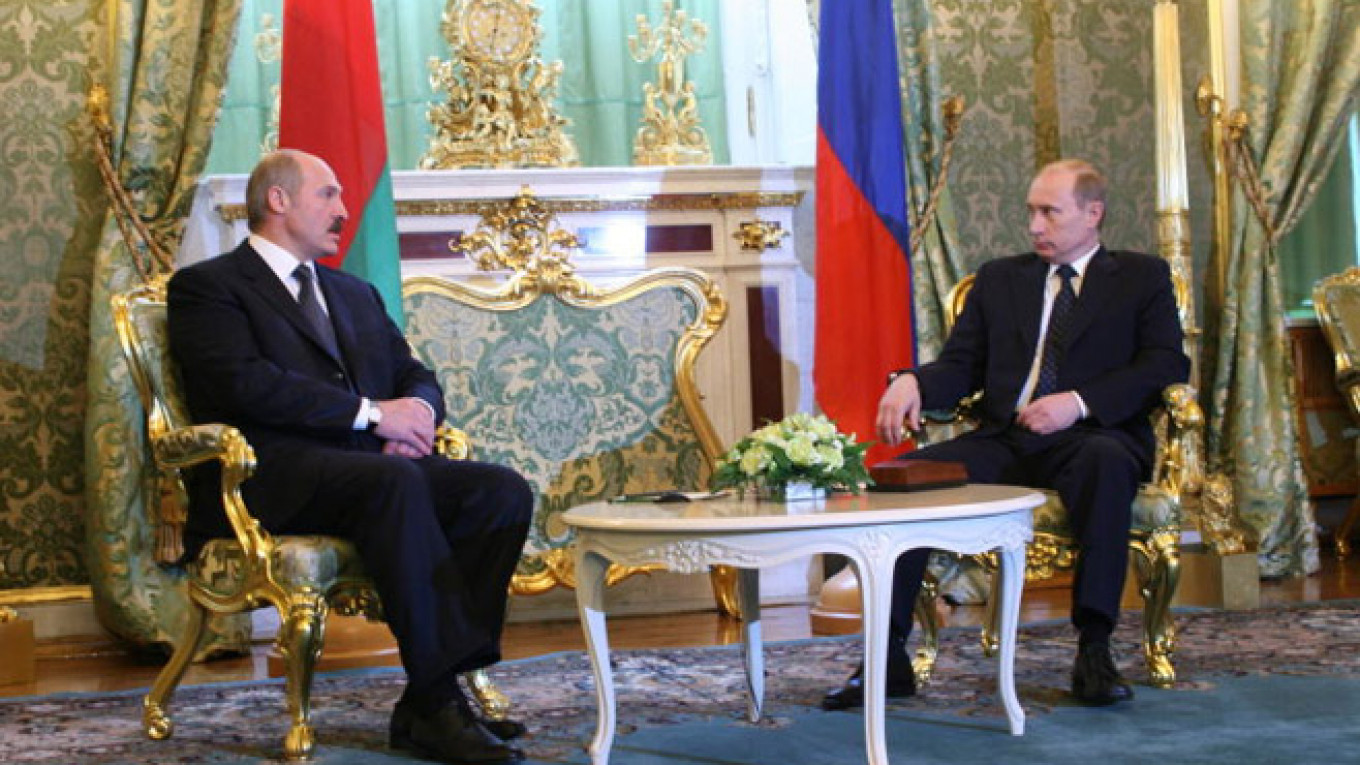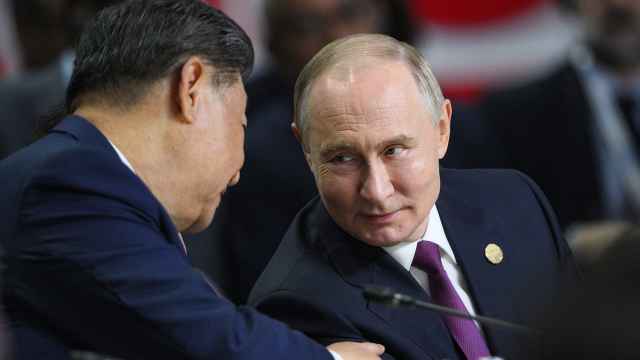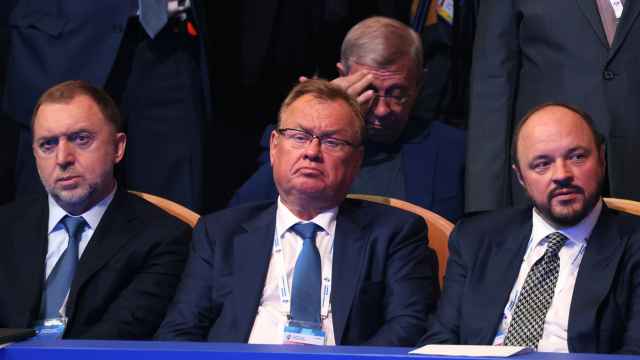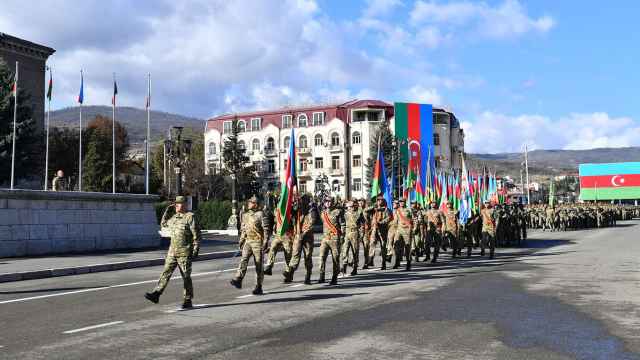On Oct. 26, Ukraine's elections showed overwhelming support for integration with Europe. One notable aspect of these elections was the parliamentary demise of the Communist Party — which failed to win a single seat in the Kiev assembly. For Belarussian President Alexander Lukashenko, this moment must have felt deeply resonant. In December 1991, he was the only deputy in the Belarussian parliament to vote against the dissolution of the Soviet Union.
When Lukashenko wants to act, he acts. When Putin wants to act, he often just talks.
By 1999, when Vladimir Putin rose from the chaos of the Yeltsin era, Lukashenko — like many former Party apparatchiks — had embraced democracy, at least in name, and seized the Belarussian presidency. Yet, though both Lukashenko and Putin appear strikingly similar, the relationship between "Europe's last dictator" and the Russian president has been slow to develop.
Critically, while Lukashenko supported maintaining the Soviet Union 21 years ago, he does not necessarily approve of its reincarnation in the form of Putin's Eurasian Economic Community. On Nov. 13, Belarussian Economy Minister Nikolai Snopkov told The Associated Press that sanctions on Russia may push Belarus toward trade ties with Europe.
Putin has endured these power games for decades: But considering the fate of former Ukrainian leader Viktor Yanukovych, Lukashenko may now face an ultimatum. His political longevity depends upon Putin: So can he and Russia's president ever be real allies?
It seems unlikely. Lukashenko's animosity toward Putin has simmered for years. In 2009, the relationship hit its lowest ebb, when Belarus joined the EU's Eastern Partnership, and Putin retaliated by banning Belarussian dairy products.
Analysts began to talk about a possible Russian-led regime change in Belarus. Though that never actually took place, Putin's annexation of Crimea this year sets an alarming precedent for future involvement. Minsk is only a day's drive from Moscow, by tank. This leaves Lukashenko increasingly dependent upon Putin.
Yet both men appear to want similar things. Since 1994, Lukashenko has tightened his stranglehold on Belarus' legislature. Putin created his famed "tandemocracy," whereby constitutional amendments allow him to maintain indefinite control of Russia by yoyo-ing between the posts of prime minister and president. Superficially, Putin and Lukashenko should get along.
Both grizzled Soviet dinosaurs — puzzled by democratic Europe — their attitudes seem strikingly similar. Yet when it comes to vote-rigging, it is possible to discern how the men differ. While Putin fights the charges of electoral fraud with a media onslaught, denying any irregularities, Lukashenko openly admits them. As he told a group of Ukrainian journalists in 2006, despite receiving 93.5 percent of ballots in the presidential election, they had to downplay his landslide victory. "People say this is not a European result, so we changed it to 86 percent," Lukashenko said.
This attitude to corruption is a line of demarcation in the feud between the Russian and Belarussian presidents. Putin dazzles with his duplicity. His ideology may be expansionist, bigoted and totalitarian — but in sharp suits and with a slick media machine, Russia's president sells this reasonably successfully. Lukashenko, on the other hand, makes no attempt to sell anything.
Whether arriving in Chechnya's capital city by fighter jet or embarking on semi-nude hunting trips into the taiga with a rifle, Putin understands the power of media. Lukashenko has derided Putin's dependence on a sullen army of PR executives. When the Belarussian president want to act, he acts. When Russia's president wants to act, he often just talks.
Putin's dim view of Lukashenko is said to stem from the fact that both men emerged from very different roles in the former Soviet Union. Russia's president was a high-ranking KGB officer. Lukashenko was a prison guard who once presided over a state-run pig farm. These factors alone could jeopardize the men's friendship.
With elections approaching next year, Lukashenko appears to be softening his public image — but unfortunately, his past PR gaffes, which have seen him adulate Hitler for delivering Germany to the pinnacle of statehood — have left a lasting impact upon the world. Putin can never form anything more than an exploitative alliance with Lukashenko — in part because he doesn't wish to sully his reputation by hobnobbing with such a buffoon.
This lack of respect for Lukashenko is not confined to Putin, it has been the prevailing attitude toward Lukashenko among the international community. But Lukashenko's media gaffes obscure a wily cunning. The only thing Putin hates more than a fool is a fool who exploits him. This is exactly what Lukashenko does.
In January, Lukashenko accepted the first installment of a $2 billion loan from Russia, as one small chunk of a 10-year intergovernmental bailout. This comradely gesture did not buy Lukashenko's loyalty over Ukraine. Lukashenko vacillated, before describing the annexation of Crimea as "setting a bad precedent," in exactly the same way that he refused to acknowledge the independence of South Ossetia and Abkhazia.
Lukashenko has begun to pit Putin against Western Europe, in a game of fiscal swingball. He can play the EU against Russia — just as Yanukovych did — while making billions in the process.
But unlike Yanukovych, Lukashenko will not be guaranteed safe passage to Moscow by helicopter, if regime change causes his dictatorship to topple. Putin doesn't view Russia's investment in Belarus as a loan agreement, but a form of hire-purchase.
Will Nicoll is a British writer and journalist who has been short-listed twice for the Shiva Naipaul Memorial Prize. You can follow him on Twitter here.
A Message from The Moscow Times:
Dear readers,
We are facing unprecedented challenges. Russia's Prosecutor General's Office has designated The Moscow Times as an "undesirable" organization, criminalizing our work and putting our staff at risk of prosecution. This follows our earlier unjust labeling as a "foreign agent."
These actions are direct attempts to silence independent journalism in Russia. The authorities claim our work "discredits the decisions of the Russian leadership." We see things differently: we strive to provide accurate, unbiased reporting on Russia.
We, the journalists of The Moscow Times, refuse to be silenced. But to continue our work, we need your help.
Your support, no matter how small, makes a world of difference. If you can, please support us monthly starting from just $2. It's quick to set up, and every contribution makes a significant impact.
By supporting The Moscow Times, you're defending open, independent journalism in the face of repression. Thank you for standing with us.
Remind me later.






